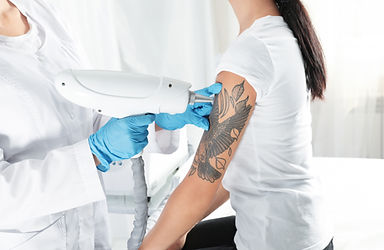Tattoo Removal Q-Switch YAG Laser
The Laser Tattoo Removal Treatment
The practitioner will apply some anaesthetic cream to the area for client comfort. The client will be fitted with protective eye goggles then laser is passed over the tattoo, you may experience some mild discomfort as the laser begins to breakdown the colour pigments. Clients often describe tattoo removal treatments like ‘being pinged with an elastic band’, but this varies from client to client. Ice may be used during the treatment to cool the skin to aide client comfort. The length of time of each treatment will vary depending on the size of the tattoo.
Post treatment
After the treatment our tattoo may turn white or red in colour. The tattoo will then be protected with a suitable covering. The area may feel tender and the skin sore, regular analgesia may be taken. You will be given an after care advice sheet to take home.

How Long Will It Take to Remove My Tattoo
The average time to remove a tattoo using the Q Switched ND YAG lasers is 4-8 treatments. Treatments are best spaced at of 4-6 week intervals. However this does vary for each client and their tattoo, as different factors such as ink type and colour, skin type, and age and location of the tattoo play a role.
At your laser tattoo consultation, your practitioner will be able to give you a better indication of how many treatments you personally need and answer any other questions you may have about laser tattoo removal.
Post-Treatment Care
The area must be protected with application of ointment and gauze for the first 24 hours, and then protected from sun exposure to prevent changes in pigmentation between treatments.
Side Effects
For most people, any side effects from laser tattoo removal are short-lived, minimal and to be expected. Some of those possible are: darkening of the skin due to inflammation, the area may itch, or feel like a minor sunburn that hurts if chafed.
However, if you have a history of scarring easily, poor wound healing, or suffer an immune problem you should discuss this at your initial consultation. There is a low risk for developing scars if you have these issues.
A not common, but possible side effect for those with darker skin is the lightening of the skin due to the loss of melanin (a substance that gives the skin it’s colour).


